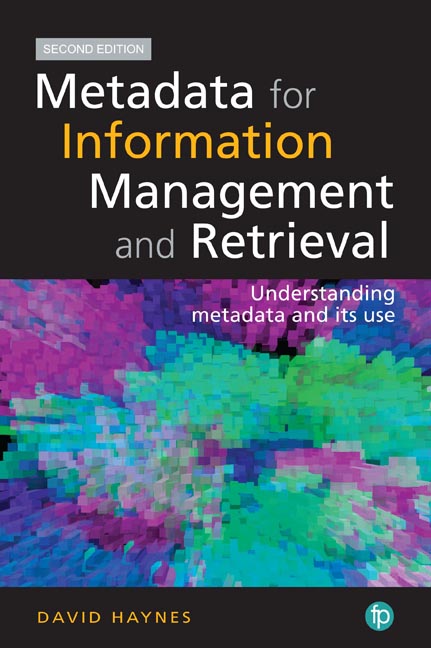1 - Introduction
from PART I - METADATA CONCEPTS
Published online by Cambridge University Press: 08 June 2018
Summary
Overview
This chapter sets out to introduce the concepts behind metadata and illustrate them with historical examples of metadata use. Some of these uses predate the term ‘metadata’. The development of metadata is placed in the context of the history of cataloguing, as well as parallel developments in other disciplines. Indeed, one of the ideas behind this book is that metadata and cataloguing are strongly related and that there is considerable overlap between the two. Pomerantz (2015) and Gartner (2016) have made a similar connection, although Zeng and Qin (2015) emphasise the distinction between cataloguing and metadata. This leads to discussion of the definitions of ‘metadata’ and a suggested form of words that is appropriate for this book. Examples of metadata use in e-publishing, libraries, archives and research data collections are used to illustrate the concept. The chapter then considers why metadata is important in the wider digital environment and some of the political issues that arise. This approach provides a way of assessing the models of metadata in terms of its use and its management. The chapter finally introduces the idea that metadata can be viewed in terms of the purposes to which it is put.
Why metadata?
If anyone wondered about the importance of metadata, the Snowden revelations about US government data-gathering activities should leave no one in any doubt. Stuart Baker, the NSA (National Security Agency) General Counsel, said ‘Metadata tells you everything about somebody's life. If you have enough metadata you don't really need content’ (Schneier, 2015, 23). The routine gathering of metadata about telephone calls originating outside the USA or calls to foreign countries from the USA caused a great deal of concern, not only among American citizens but also among the US's strongest allies and trading partners. The UK's Investigatory Powers Act (UK Parliament, 2016) requires communications providers to keep metadata records of commun - ications via public networks (including the postal network) to facilitate security surveillance and criminal investigations. As Jacob Appelbaum said when the Wikileaks controversy first blew up, ‘Metadata in aggregate is content’ (Democracy Now, 2013). His point was that when metadata from different sources is aggregated it can be used to reconstruct the information content of communications that have taken place.
Information
- Type
- Chapter
- Information
- Metadata for Information Management and RetrievalUnderstanding metadata and its use, pp. 3 - 18Publisher: FacetPrint publication year: 2018
